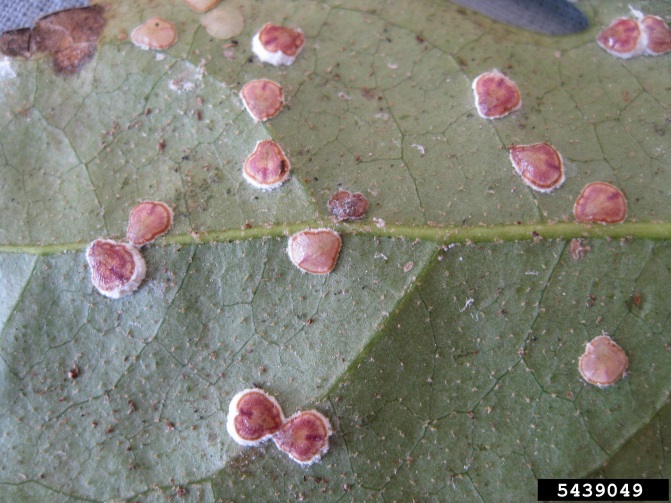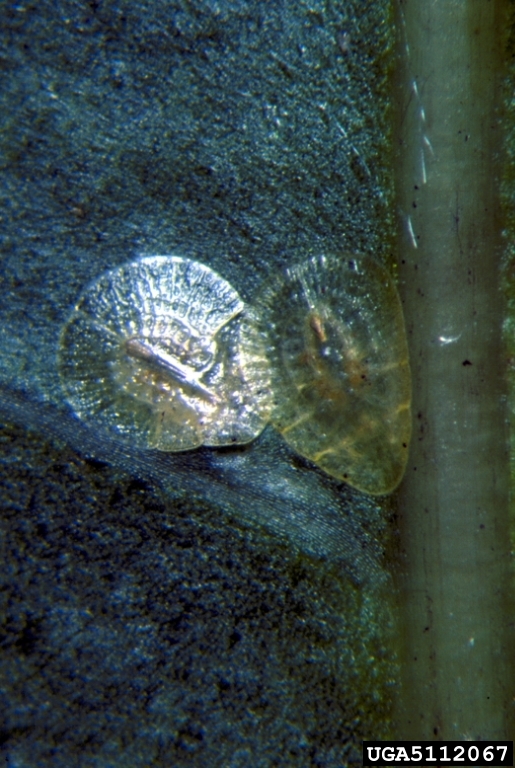
Pyriform scale
| Primefact number | Edition | Published | Author |
|---|---|---|---|
| 1416 | First | Jul 2015 | Plant Biosecurity and Product Integrity |


Pyriform scale (Protopulvinaria pyriformis) is an exotic plant pest. This insect pest is a threat to Australia’s avocado, mango, banana, passionfruit, forestry and nursery and garden industries.
The May 2015 detection of pyriform scale in Perth is the first case of a species of Protopulvinaria scale occurring in Australia.
Notifiable status
Pyriform scale (Protopulvinaria pyriformis) is a notifiable plant pest in NSW.
All notifiable plant pests and diseases must be reported within 1 working day. You can report notifiable plant pests and diseases by one of the following methods:
- Call the Exotic Plant Pest Hotline 1800 084 881
- Email biosecurity@dpi.nsw.gov.au with a clear photo and your contact details
- Complete an online form
A full list of notifiable plant pests and diseases can be found in Schedule 2 of the NSW Biosecurity Act 2015.
Description
Scale insects have a protective coating that gives them a raised scab-like appearance on leaves. Pyriform scales have a pear shaped body surrounded by a white waxy fringe (Figure 1).
Pyriform scales feed on the underside of the leaves and secrete a clear, sugary liquid known as honeydew.
First stage nymphs are translucent green in colour (Figure 2). In later stages, body colour changes from translucent green to light green. Adults are light brown with characteristic white fringing and can grow to 3 mm (Figure 1).
Damage
Direct damage is caused by pyriform scales feeding on plant sap and impacting the plants’ nutrient uptake.
Heavy infestations of pyriform scale on plants can result in reduced vigour, leaf drop and reduction in size and quality of fruit.
Indirect damage is caused by the growth of black sooty mould on leaves. Sooty mould growth is encouraged by honeydew secreted by pyriform scales as they feed.
Sooty mould covers leaves and fruit, blocking sunlight and minimising energy available to the plant.
Lifecycle
Female pyriform scale can reproduce asexually, laying up to 300 eggs without having to mate.
Pyriform scale nymphs emerge from eggs laid under the female’s body. Nymphs are able to crawl slowly on the leaf. They settle to feed a day or two after emergence.
Nymphs go through three growth stages before reaching adulthood. All growth stages of pyriform scale are capable of movement, though movement is minimal once feeding begins.
The number of generations completed per year is host dependent. Avocado will support two generations per year, ivy can support three and some hosts support several overlapping generations.
Host range
Pyriform scale has a wide host range of more than 100 species across 34 plant families.
Hosts include a number of horticultural and ornamental plants such as mango, avocado, citrus, banana, guava, passionfruit, pomegranate, papaya, eucalyptus, hibiscus, gardenia, ivy, myrtle, laurels, paperplant and frangipani.
Spread
Long distance spread of pyriform scale occurs as people move infested host species, particularly fruit and ornamental plants.
Short distance spread of pyriform scale can occur when insects are blown by wind to nearby plants.
Distribution
Pyriform scale is widespread throughout the USA, Central America, South America, eastern Europe and southern Africa and has been reported in Japan, Thailand and Taiwan.
Australian distribution
Pyriform scale was first discovered in the Perth metropolitan area in May 2015. Later detections have been made on a variety of host plants in a number of surrounding suburban areas in Perth.
Actions to minimise risk
Put in place biosecurity best practice actions to prevent entry, establishment and spread of pests and diseases:
- practice “Come clean, Go clean”
- ensure all staff and visitors are instructed in and adhere to your business management hygiene requirements
- monitor your plants regularly
- source plant material of a known high health status from reputable suppliers
- keep records

